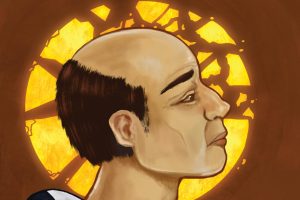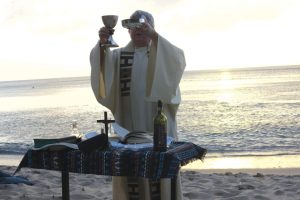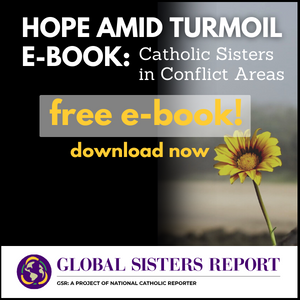In 1966 U.S. Catholic visited Dorothy Day and the Catholic Worker in New York. Part of a series for U.S. Catholic's 75th anniversary.
"To say that Dorothy Day is a saint is to run the risk of boring people," wrote Bruce Cook in the April 1966 issue of U.S. Catholic. In the second installment of his 10,000-word, two-part article on Dorothy Day and the Catholic Worker movement she co-founded, Cook continued, "It has been written, whispered, and proclaimed so often . . . that the notion that we have among us one whose life . . . clearly bears many marks of sanctity has become little more than a commonplace. People no longer are very interested."
Day herself, 68 at the time, was thoroughly annoyed by such talk. "She hates it," her friend Betty Bartelme told Cook. "She calls it being ‘prematurely canonized.' "
Day sensed that what many who called her a saint really meant was: "Oh, yes, that Dorothy Day, she's a saint, all right . . . and all the rest of [her] looney Catholic Workers. . . . All that pacifism and works of mercy . . . well, that would be great if the world were made up of saints like Dorothy Day. But it's not. I mean, there's such a thing as taking what it says in the Bible too literally."
After discussing Peter Maurin, the other co-founder of the Catholic Worker; some of the movement's more famous "alumni" (including then-Senator and soon-to-be presidential candidate Eugene McCarthy); and her past fiction writing, Cook asked Day directly how it felt being called a saint.
"Dorothy snorted and waved her hand in disgust. ‘Oh,' she said, ‘this has been going on since the Second World War. It's just an easy way to write us off. . . .' She smiled suddenly then, with an almost mischievous expression on her face, and said, ‘They still call me Moscow Mary, though.' ''
At her death in 1980, historian David O'Brien would call Day "the most influential, interesting, and significant figure" in the history of American Catholicism. And a couple of years later U.S. Catholic's long-time columnist Father Henry Fehren made the case for her official canonization.
Fehren's article "Let's canonize Dorothy Day" in the magazine's sister publication Salt gave three reasons why she was "a saint for our time and place": she was an independent layperson "always loyal to the church but always responsible to Christ"; her "thorough opposition to war and the means of war"; and she modeled a contemporary, realistic way to be a saint by showing "how to love" today.
Although Day was loath to be dismissed as a plaster-of-paris saint on a pedestal, canonizations-like funerals-are more for the living than for the dead, Fehren pointed out. Canonization would mean that "more people would learn about her and be inspired and strengthened by her."
In 1998 another Catholic Worker "alum," Robert Ellsberg, told U.S. Catholic that a St. Dorothy Day would bring three special gifts: her life's vocation of combining charity with justice, her rediscovery and commitment to the ideal of gospel nonviolence, and her example of lay leadership in the church.
Following Fehren's article, the Claretians, publishers of U.S. Catholic, initiated a grassroots effort for Day's canonization that has included the publication of prayer cards and posters (still available from our office ) as well as collecting letters and testimonies in favor of Day's canonization.
In 1997 the Claretians renewed their call for Day's canonization by presenting the testimonies they had collected to Cardinal John O'Connor, asking him to initiate the official canonization process. It was at O'Connor's request that in 2000 the Vatican declared Day a Servant of God and officially opened her sainthood cause.
In her 1966 interview with U.S. Catholic, Day expressed some exasperation with visitors to the Catholic Worker's St. Joseph House of Hospitality who, upon seeing the poverty there, "whisper to each other, ‘How can they live like this?' Don't they know that this is how many people in America have to live? What can we do about it?"
"Well," she sighed, "I do think that sooner or later we really should give Christianity a try sometime. Don't you?"
For more on Dorothy Day, please visit our special section "Dorothy Day — a saint for our times,"














Add comment